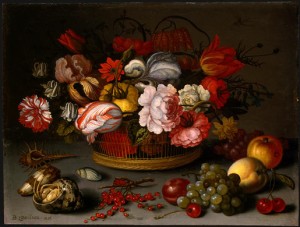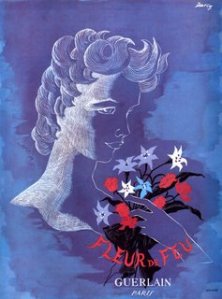The dance of scent – still life awakened
Odors have a power of persuasion stronger than that of words, appearances, emotions, or will. The persuasive power of an odor cannot be fended off, it enters into us like breath into our lungs, it fills us up, imbues us totally. There is no remedy for it.
– Patrick Süskind Perfume: The Story of a Murderer
Basket of flowers, Balthasar van der Ast c. 1622
I have been a happy prisoner of scent for as long as I can remember. On the right of this text under the section ‘Les battements de mon coeur’ there is a link to Luca Turin’s website. I came across him when trying to uncover what lay behind my own obsession with perfume and I stumbled upon his theory of the science of scent. Turin, a biophysicist, has such an obsession with olfactory pleasure and how it works upon us that a book about his work ‘The Emperor of Scent’ (what a glorious epithet!) was written by Chandler Burr. Since then he has written up his new theory, utilising the ideas established by an older theory, of what makes scent work. I had long been convinced that my own preoccupation with fragrance was somehow related to my synaesthesia, which is in turn inseparable from my sense of music. Turin’s theory grabbed me straight away – he concluded that unique molecular vibrations, a symbiosis of chemical elements hitting off each other lies behind how scent is ‘built’. I am not going to attempt to explain his theory here, he does it so well himself, and there is a link below to see him do so.
To a musician this made perfect sense – entirely Pythagorean, a panoply of the accordant and the discordant it overawes, a ‘musica universalis’ for the nose. This mischief of fragrance’s molecular dance is enchanting. I am not saying that those who really ‘get’ scent are indubitably musical, maybe there are some who are tone deaf, somehow I doubt it, but herein may be the answer as to why I am so obsessed with scent. There are people who apply perfume thoughtlessly, it is bought for them, it is there and they use it, without ever really knowing if they truly like it or even love it, perhaps the same way they would only listen to a certain movement of fairly unimaginative music and not venture into the complexities of late Beethoven. Then, there are those whose noses catch even the slightest waft of a favourite fabric softener or stumble across an old bar of Morny soap and are in raptures, the accords of those valuable molecules gripping us as a Chopin nocturne might. We are different, we are obsessed with the pleasure and moreover, the depth of pleasure there is in scent. Believe me, this is not confined to the floral – yes flora will always appear in perfumes but so do suggestions of burnt rubber, coal, pipe tobacco, leather and antiquarian books. Magnificent combinations of these, or rather their biochemical counterparts, assemble in the complex structures of some of the world’s finest perfumes.
Advert by Darcy for Guerlain 1949
Scent changes mood, builds pictures, delivers us enchanted dreams and emblazoned memories and yet it is so immediate. Perfume moves us, like music, as Baudelaire describes in ‘Correspondances’ –
Ayant l’expansion des choses infinies,
Comme l’ambre, le musc, le benjoin et l’encens,
Qui chantent les transports de l’esprit et des sens.
It has the expanse of the infinite, it sings of the ecstasy of the mind and of the senses – with one small bottle of Chanel’s Cuir de Russie you are an emigrée marquise in deep green velvet on a train anointing her temples amid old Vuitton trunks, or in the case of Guerlain’s potent paradise – L’Heure Bleue, walking slowly through a garden on the Cap d’Antibes, clutching a cape as an early autumn breeze blows off a Corsican escarpment over the Mediterranean. Perfume is more than flowerbeds and Fragonard belles, perfume is art and moreover it is affordable art, affordable luxury. You may not be able to buy a Rubens or a Picasso but it is not beyond even the more modest purse to purchase some of the world’s greatest perfumes – a living, breathing version of a Van der Ast still life, the alertness of the lemons in a Zurbaran, or a Botticelli cornucopia. That it plays upon my senses the way Turin describes assigns it to a satisfying answer, but one that has no less mystery. I treasure it, I cannot live without it.


